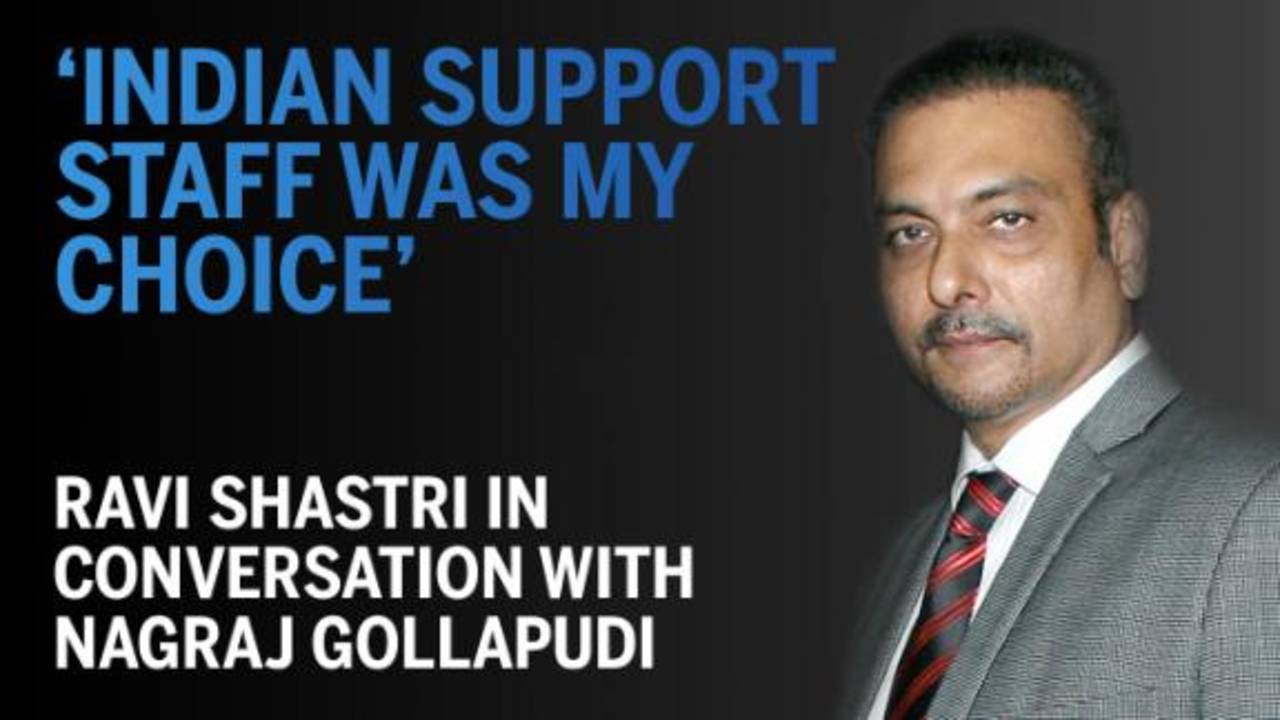'People would have accepted 3-1 if there was a little more fight'
In an exclusive interview Ravi Shastri, India's new team director, talks about what needs to be done for India to bounce back
Nagraj Gollapudi
20-Aug-2014
What made you take up this assignment?
It was an important time in Indian cricket. When asked I thought about it and then said, "fine". The state of Indian cricket is such that I know I can contribute. I have never been scared about how tough the job is or how easy the job is. The important thing is the contribution. If I am here today, and at times some forget, it is because of the BCCI. The platform they gave me when I was a junior cricketer to play for my state and then the country.
What is your role exactly?
My role is to oversee everything. All of them report to me. This is for the ODI series in England.
What about Duncan Fletcher. Would he be sidelined?
Absolutely not. He stays as the head coach. And these two (Sanjay Bangar and B Arun) will be his assistants.
Did you have a chat with MS Dhoni and Fletcher?
I spent about two hours with them (on Tuesday). We had a chat about where things are at the moment, how things have to be addressed, and how important communication will be.
Were there any reservations you had before taking up the job?
I had no reservations about the job. I insisted on the coaching staff I wanted. I went (for domestic Indian coaches) because I felt they can contribute.
What were the reasons you felt India failed in the Test series?
If you put it down to one word - inexperience. If you calculate the number of Test matches played by the XI as opposed to some of the tours where we fared worse, here we at least won a Test match. We did not win a Test in 1974 (3-0) and were whitewashed on the last tour here with some of the biggest names (in the team). So if you calculate the number of Test caps between this unit and some of the other units that have come (in the past), it is chalk and cheese.
On this tour I saw India's greatest ever overseas win I have seen. I know it because I have never seen a track like that and with this kind of inexperienced side for them to pull it off. Then I also saw some spineless cricket over the last three Tests matches.
When you say spineless, what went missing?
Spineless means stomach for a fight. People would have accepted 3-1 if there was a little more fight. The conditions what you saw here, barring the first Test, every track had serious juice on it. When I evaluate everything I put it down to inexperience. When they come back to England (next time) they would be better players.
People can be judgmental, but we have not played a five-Test match series in a long time. When you play five Test matches in 40 days your fitness gets exposed. But if you are inexperienced it comes to the fore. What does experience do? It builds your mental strength - when you are down, you can still recover. But here when you lack the experience and when you get hammered, or you have two or three innings where you don't do well, then you go downhill straight.
What is the message you want to send to the players?
My challenge is for the boys to enjoy themselves, play freely and express themselves. Work hard and use the cricket ground as a vehicle to express yourselves and play aggressively.
What was the most disappointing thing for you about the Indian teams's failure in Test series?
My only disappointment was players at times making the same mistake. That disappointed me. Everyone makes a mistake, but you want to try something different. Like [Alastair] Cook. He changed his stance, stood a foot outside the crease. You need to try something different instead of getting out the same way.
After the Tests series defeat you went hard on the players in your newspaper column: "Sit back and watch if these glam boys are ready for penance. If they are prepared to plunge their bare hands into the coal of fire and start from scratch." What exactly did you mean?
I was hard on [Cheteshwar] Pujara and [Virat] Kohli specifically because they came here with big reputations. And they have been brought down to earth with their techniques being found out against the moving ball. And there is nothing wrong in that, it has happened to the biggest players. Rahul Dravid in 1999 in Australia - he could not get a run. It has happened to Sunny (Gavaskar) in 1981 in Australia. Now the true test of their (Pujara and Kohli) character will be: how they bounce back. I have absolutely no doubt that not only will they bounce back, they will excel very, very soon.
Nagraj Gollapudi is an assistant editor at ESPNcricinfo
